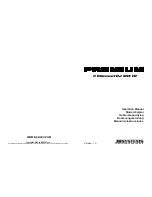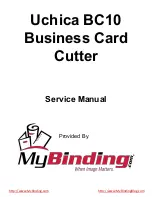
• head and tail pulley are square to the frame and parallel to each other
• plow is contacting underside of the belt, belt is engaged with guide rollers.
Note
● Do not adjust belt tracking rollers, they have been factory set.
● Belt plow blades are adjustable vertically for proper contact to the belt.
Turn on the weighfeeder and observe its tracking line on the head and tail pulleys. If the belt is
drifting toward one side of the weighfeeder, then adjust the telescoper on either side of the
machine (see Telescoper adjustment (Page 20)).
7.6
Telescoper adjustment
1. Determine which side of the weighfeeder you want to adjust. Compressing the telescoper
on one side will cause the belt to drift toward that side of the weighfeeder. Conversely,
extending the telescoper will cause the belt to drift away from that side of the weighfeeder.
2. Loosen the jam nut.
3. Turn the adjusting screw in the desired direction. Often, only a small amount of adjustment
(1 turn or less) will be required.
4. Observe the results of the adjustment and then readjust, if necessary.
Steps 2 and 3 may need to be repeated to obtain perfect belt tracking.
Note
As you extend or compress the telescoper, you may be changing the belt tension. If belt
tension has increased (or decreased) considerably while attempting to track the belt, then
compress (or extend) both telescopers and complete the belt tracking process again. To
avoid this problem, extend one telescoper while compressing the other to obtain proper belt
tracking.
5. Re-tighten the jam nut located on the telescoper to maintain the new telescoper position
after completing the tracking procedure.
6. If you are having problems tracking the belt, consult your Siemens representative. Common
causes of belt tracking problems are: uneven or improperly distributed product loading,
twisted frame, or product buildup on head or tail pulleys.
Commissioning
7.6 Telescoper adjustment
SITRANS WW200
20
Operating Instructions, 06/2018, A5E33560654-AC
















































